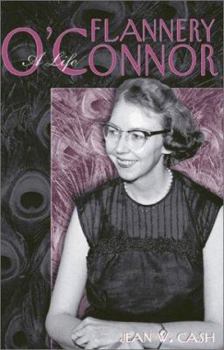Flannery O'Connor: A Life
Select Format
Select Condition 
Book Overview
Flannery O'Connor (1925-1964) ranks among the foremost writers of fiction in American literature. Her short stories, in particular, are considered models of the form. Born in Savannah, O'Connor spent most of her life in Georgia and infused her work with southern characters, themes, and landscapes. A devout Catholic, she addressed the mystery of God's grace in everyday life, often amid the grotesque, the shocking, and the violent. In this first full-length biography of the writer, Jean W. Cash draws upon extensive interviews with O'Connor's friends, relatives, teachers, and colleagues as well as on the writer's voluminous correspondence to provide a sensitive, balanced portrait of a fascinating woman. As Cash demonstrates, O'Connor's sheltered childhood, extraordinary intellect, spiritual certainty, and unique personality--including a wry sense of humor--combined not only to make her something of an outsider but also to foster her literary genius. As a child, her favorite activities were reading, writing stories, and drawing. Perhaps more unusual was her childhood feat of teaching a rooster to walk backwards. Her passion for exotic fowl later found expression in the peacock symbolism in her fiction. The family moved to Milledgeville, Georgia, in 1938, and there O'Connor attended high school and college. She left the South in 1945 and entered the graduate writing program at the University of Iowa, where she completed several chapters of her first novel, Wise Blood. She went on to live at the Yaddo writers' colony in Saratoga Springs, New York, and she might have spent her most creative years in the North if illness had not interfered. However, lupus--the same disease that had killed her father--forced her to return to Milledgeville, where she lived and wrote for the remaining fourteen years of her life under the protective care of her mother. The latter chapters of Cash's biography address O'Connor's adjustment to her debilitating illness and to a more circumscribed existence. As Cash explains, she learned to accommodate her mother's insular outlook, and in many ways her fiction profited artistically during this period. Her friendships and active correspondence added to the variety and vitality of her life. She also traveled widely on the lecture circuit and reviewed books for a local Catholic publication. Even in her illness and relative isolation in Milledgeville, O'Connor continued to live a richly rewarding and creative life. The Author: Jean W. Cash is professor of English at James Madison University.
Format:Hardcover
Language:English
ISBN:1572331925
ISBN13:9781572331921
Release Date:January 2002
Publisher:Univ Tennessee Press
Length:376 Pages
Weight:1.52 lbs.
Dimensions:1.1" x 6.0" x 9.0"
Customer Reviews
3 ratings
excellent
Published by Thriftbooks.com User , 17 years ago
This book does what it's supposed to do. It tells you a lot about Flannery O'Connor, her likes and dislikes, her influences, how and where she spent her time. It's not meant to be a critical study. There are plenty of those. Most readers will find here details on a fascinating creative artist whose life was cut short by illness.
Partially Satisfactory
Published by Thriftbooks.com User , 22 years ago
Better than *Publisher's Weekly* suggests, Jean Cash's life of Flannery O'Connor still it isn't all it could be. Its strengths are its fidelity to the events of O'Connor's largely unexciting life as a practicing writer and Catholic and, in this age of the doorstop biography, its modest length. Cash mines *The Habit of Being,* Sally Fitzgerald's 1979 collection of letters, and the archives she dutifully has read through. O'Connor's brilliance, orneriness, intractibility, deadpan humor, courage, honor, talent (at least by repute), and doggedness come through. In some ways, that's enough--four stars. However, one who finishes this book may still want more.What is missing? An extended understanding of the interplay the fiction and the life, for one. Why did Hazel Motes and Julian and Tarwater and Rayber come out in just that form? When Cash discusses the connections between O'Connor's mother, Regina Cline O'Connor, and Mrs. Hopewell (in "Good Country People"), her book takes on life. More, more! Again, without naming it or discussing it at any length Cash points to the self-loathing that was the other side of O'Connor's spirituality and selflessness. The presentation needs pointing up, development.For another, a sense of O'Connor's achievement as an artist. The fiction, which is what counts or we wouldn't be reading the life, is almost not there. My own judgment is that the two novels matter much less than and are ungainly compared to half a dozen stories, in which form perfectly embodies vision--with humor, intellectual force, and the many-sidedness of a great writer. This text needs more engagement with O'Connor's text.Finally, Edward F. O'Connor, the father. His death, when his daughter was fifteen, surely underlies what Cash describes as the "matriarchal" world of the fiction. If it bears on Flannery O'Connor's own atrophied love life and even for her choice of *What Maisie Knew* as the work of Henry James that most interests her, those connections should be made. Cash has the facts, but the figure in the carpet needs highlighting. Otherwise, one might as well read Sally Fitzgerald's nineteen page biographical sketch at the end of the Library of America volume on O'Connor.It is unfair to blame the author for this, but the decorative peacock feather ovals make the page numbers hard to read!
Outstanding!
Published by Thriftbooks.com User , 22 years ago
This biography does what any good biography of a writer should: It invites you to run to the shelf to revisit the writer's work. As wickedly witty and charming as she was devout, Flannery O'Connor comes fully alive again in Jean Cash's careful detailing of her tragically brief life. Readers--including scholars and students--should welcome this rich portrait of the artist, particularly as it challenges some of the rampant misperceptions of O'Connor and her work.






